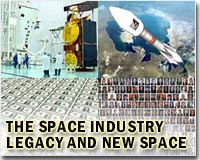 |
Dubai, UAE (SPX) Apr 07, 2011 Commercial opportunities along with military and humanitarian demands driving the need for sustainable space and satellite programmes across the Middle East will be in focus at the Global Space and Satellite Forum (GSSF) 2011. "Regional unrest seen in some parts of the Middle East and North Africa over recent months demonstrate the importance of national security and the intelligence-gathering roles that satellite technology can support," said Nick Webb, Director, Streamline Marketing Group, organisers of GSSF 2011. As leading experts will explain during the three-day event, which takes place at ADNEC in Abu Dhabi from 9-11 May, satellite communications also play an important role in disaster relief, particularly in re-establishing communications in areas where normal landlines and mobile telephone infrastructure are destroyed, such as virtually the entire west coast of Japan after it was hit by the Tsunami recently. Among the experts speaking at the conference is John B. Sheldon, Professor of Space and Cyberspace Strategic Studies, School of Advanced Air and Space Studies, Alabama, United States. Sheldon's presentation, Sustainable Space Policy and Programs in an Era of Volatility, provides an overview of the geopolitical ramifications of Middle Eastern space programs and outlines how space capabilities can contribute to regional stability and prosperity. He looks at the requirements of a nation seeking to create a sustainable space policy, including rigorous geopolitical analysis and strategic planning across the various stages, including development, acquisition, operation and protection of space capabilities. "Among the numerous arguments for the creation of sustainable space programmes is the growing congestion, competition and complexity of the space environment, compounded by economic uncertainty and a geostrategic environment in a state of constant flux. Sustainability strategies can help regional space policy makers navigate these challenges." said Sheldon. In addition to the long-established players in the international space race - including the US, Russia, China, India, Japan and France - the UAE, South Africa, Iran, Kazakhstan, Nigeria and a number of smaller European nations are ramping up their investment. According to the Royal United Services Institute, there are now at least 50 countries around the world with established space agencies and who have developed and launched satellites. The UAE currently has one satellite in orbit, the DubaiSat-1 Earth Observation Satellite, which was launched in early 2009. Additionally, the Yahsat-1A Communications Satellite is due to launch within the next few months, having attracted some $1.4 billion in funding from the Abu Dhabi Government's investment division, Mubadala. Another government-backed organisation, Aabar Investments, has also committed $280 million to Virgin Galactic's spaceport, the embryonic space tourism sector, which experts estimate could be worth $7.5 billion by 2030. "Stakeholders within the region's space, science and related technology sectors will gather in the UAE capital to hear about the significant opportunities that exist, particularly within the telecommunications, media and entertainment sectors," commented Webb.
Share This Article With Planet Earth
Related Links Global Space and Satellite Forum The latest information about the Commercial Satellite Industry
 Microsoft co-founder slams Bill Gates in new book
Microsoft co-founder slams Bill Gates in new bookWashington (AFP) March 30, 2011 Bill Gates plotted to grab Microsoft shares from his cancer-stricken business partner Paul Allen, the software firm's co-founder has claimed in a new memoir. Painting a unfavorable view of Gates and his rise to the pinnacle of global business, Allen details Gates' 1982 scheme "to rip me off," just as Microsoft was becoming a computing powerhouse with its MS-DOS operating system. In an ex ... read more |
|
| The content herein, unless otherwise known to be public domain, are Copyright 1995-2010 - SpaceDaily. AFP and UPI Wire Stories are copyright Agence France-Presse and United Press International. ESA Portal Reports are copyright European Space Agency. All NASA sourced material is public domain. Additional copyrights may apply in whole or part to other bona fide parties. Advertising does not imply endorsement,agreement or approval of any opinions, statements or information provided by SpaceDaily on any Web page published or hosted by SpaceDaily. Privacy Statement |